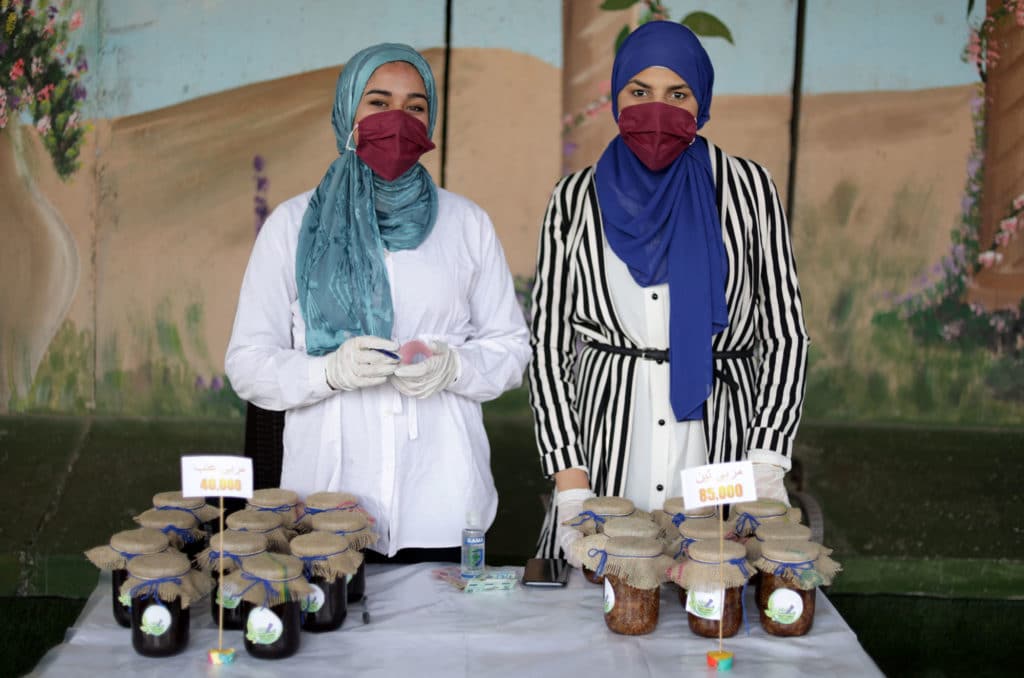Ein El Hilweh is the largest Palestinian refugee camp in Lebanon. It was established in 1948 by the International Committee of the Red Cross. Since then it has witnessed violent clashes, aerial bombing and years of bloody conflict.
Beginning in 2012, the camp’s population swelled from 70,000 to more than 120,000 due to the influx of refugees from Syria. Some of these newcomers were Palestinians who had already been refugees in Syria, now forced to flee a new conflict. In 2016, Lebanese authorities built a wall with watchtowers around the camp.
The camp is known for its security problems, due to the disputes between political factions and small arms weaponry circulating in the camp. The clusters of small, grey, concrete houses leaning on one another do little to alleviate the overcrowding in this under-serviced urban camp.
Despite these hardships, the residents of this camp have made it their home away from home. And at the heart of this unsettling place is a safe space for women, children and youth. The Women’s Programs Association is one of Anera’s longstanding local partners that offer vocational courses through our Youth Empowerment, Education, and Employability Program, a partnership between Anera and UNICEF.
The cooking and food preservation course is one of several courses provided at the WPA center. The objective of these courses is to equip marginalized youth with technical capacities in marketable professional areas. Food preparation is one of these disciplines. Everyone enjoys a well-cooked, traditional home meal.
After completing the cooking course, the participants were enrolled in a course on the traditional food preservation technique known as mouneh — often called canning in English. They learned how to dry and pickle vegetables, extract oils, produce pastes and age cheeses. Near the end of their training, the young chefs organized an exhibition to display and sell their products.
Almazah Al-Sharqawi, the supervisor of WPA, is proud of the students. “Look at all these homemade mouneh, prepared entirely by 20 young women and men,” she says, pointing at the food stands.
The profit from the goods sold here will be used for the establishment of a small business, catering service and kitchen called the Al-Asala Home Kitchen. The new enterprise will serve as a means of creating jobs for the young chefs, and as well as future trainees.
The WPA plans to create a permanent exhibition of mouneh for sale inside the WPA center. They are also working with local shops to display and sell the preserved foods. “Soon, the project will generate income for the students,” Almazah says.
These types of projects are life changing for many of the students. Firas is a 20-year-old Palestinian resident of Ein El-Hilweh camp. He had to drop out of school in the ninth grade, and has struggled to find work
.
“After several failed attempts to find a job, I found myself spending most of my time with friends without a clear vision for the future.”
But he is proactive about finding opportunities for work experience that will enable him to find steady work in the future.
Firas found his calling in these courses and he finally has a goal that he wants to achieve. He wants to open a business with his mom. “I learned how to make all kinds of mouneh from pickling, chilly paste, makdous, and all kinds of jams.”
His mother, like many Palestinian women, was already making mouneh for her family at home. But she had always focused on a few foods. “I would like to develop my mother’s work,” Firas says, “and I hope, through the financial returns, to purchase the equipment I’ll need to establish our very own mouneh business.”
“I learned how to make all kinds of mouneh from pickling, chilly paste, makdous, and all kinds of jams.”
Raghad Al-Khatib is another young chef. The 17-year-old Palestinian wants to start her own line of healthy homemade mouneh products.
“In this course, we learned how to make mouneh of all kinds, like jams, dairy and cheese products, and sorts of pickles. My favorites are the distillates, things like rose water and blossom water, that can be added to food as sweeteners.”
“My favorites are the distillates, things like rose water and blossom water, that can be added to food as sweeteners.”
As with most of the vocational courses in this program, this course covers not just technical skills, but also includes life and social skills, which can enhance participants’ self-confidence, problem-solving and communication skills. These are vital skills for starting and running a small businesses, and hopefully positions course graduates and their enterprises to thrive.
The varied and colorful array of preserved food products at the mouneh exhibition was impressive. More importantly the prices on the locally-produced foods make them affordable, and an economical solution to food shortages during the economic crisis.
“We at WPA are so thankful to Anera and UNICEF for this opportunity to serve and support youth in our society,” Almazah says.



